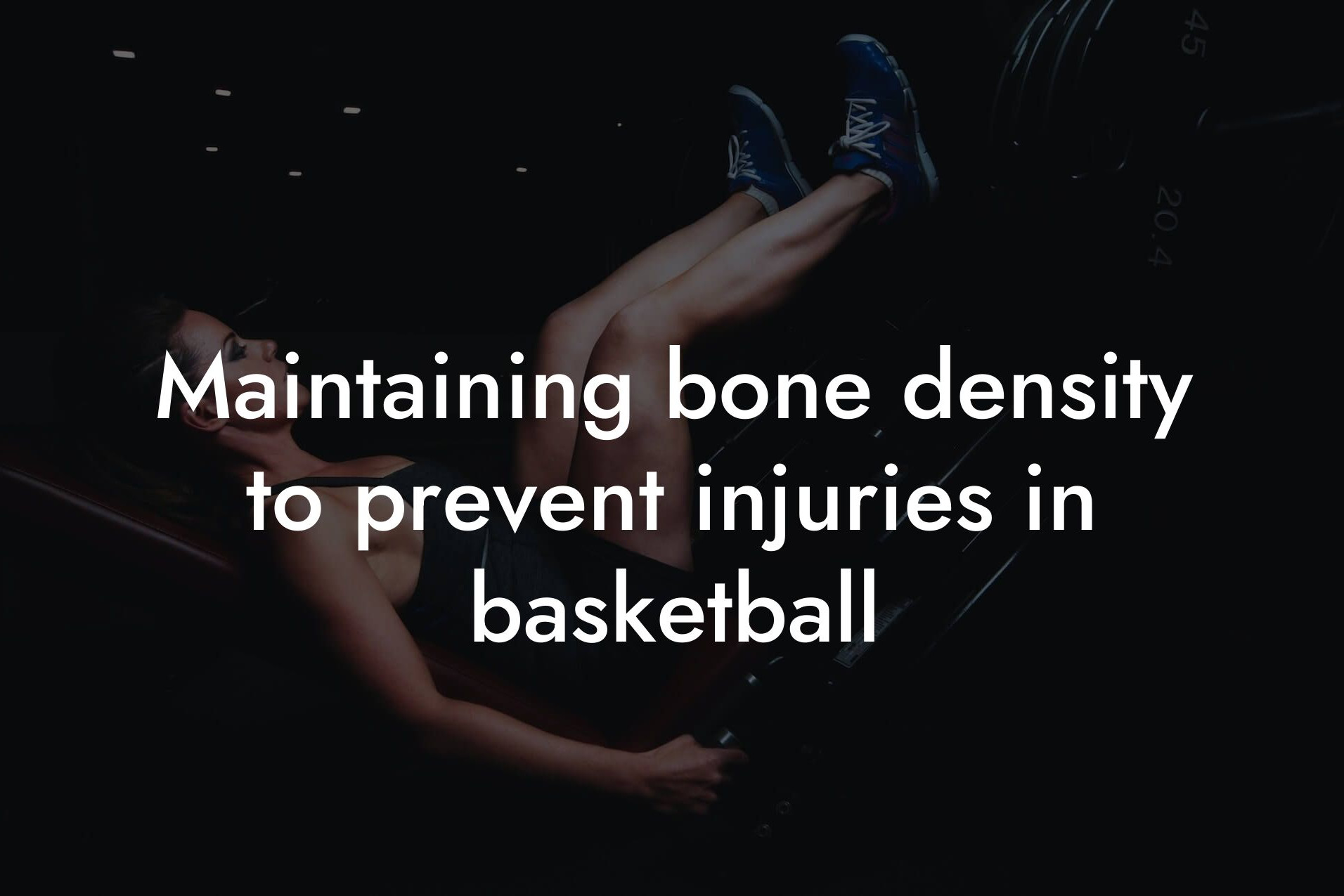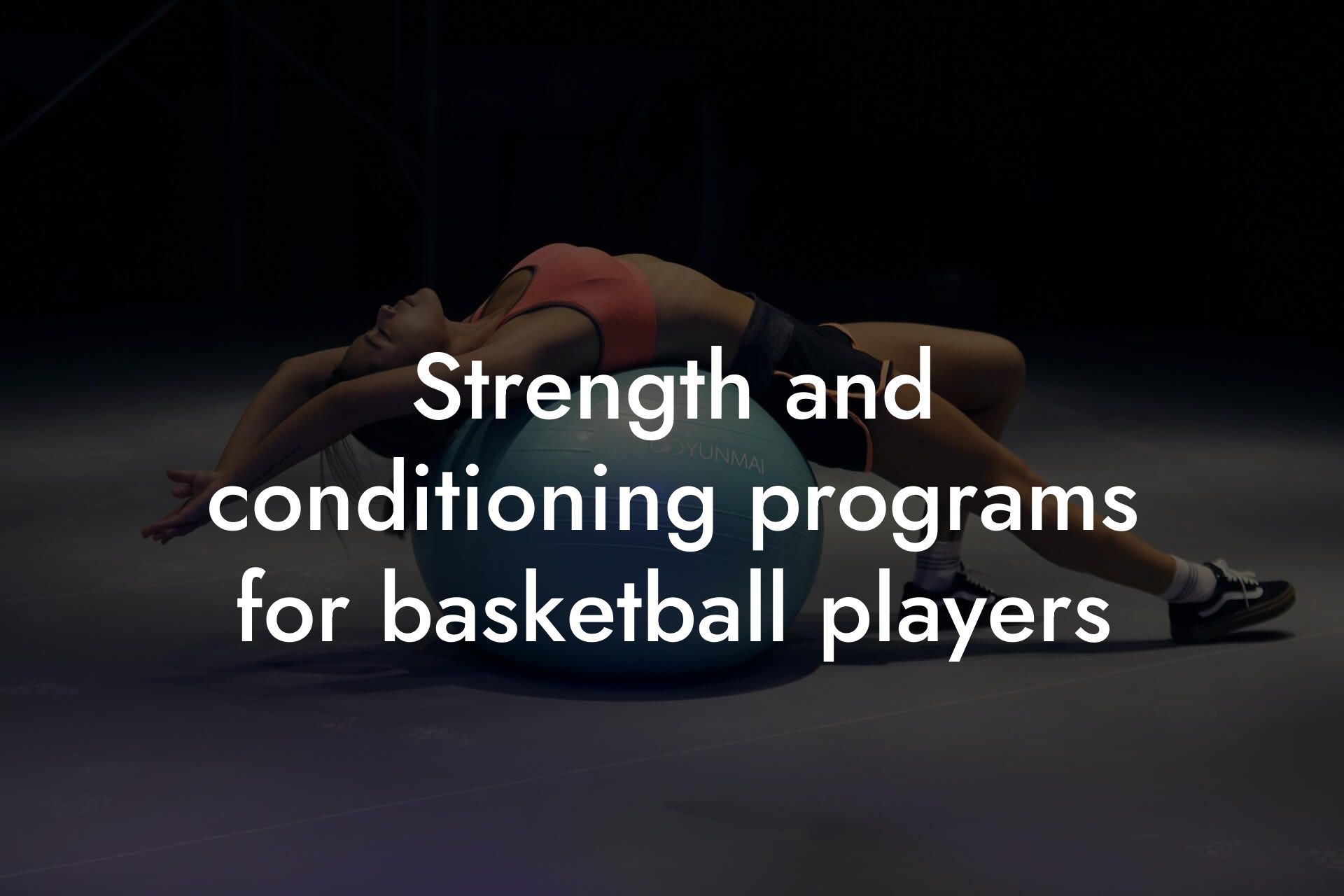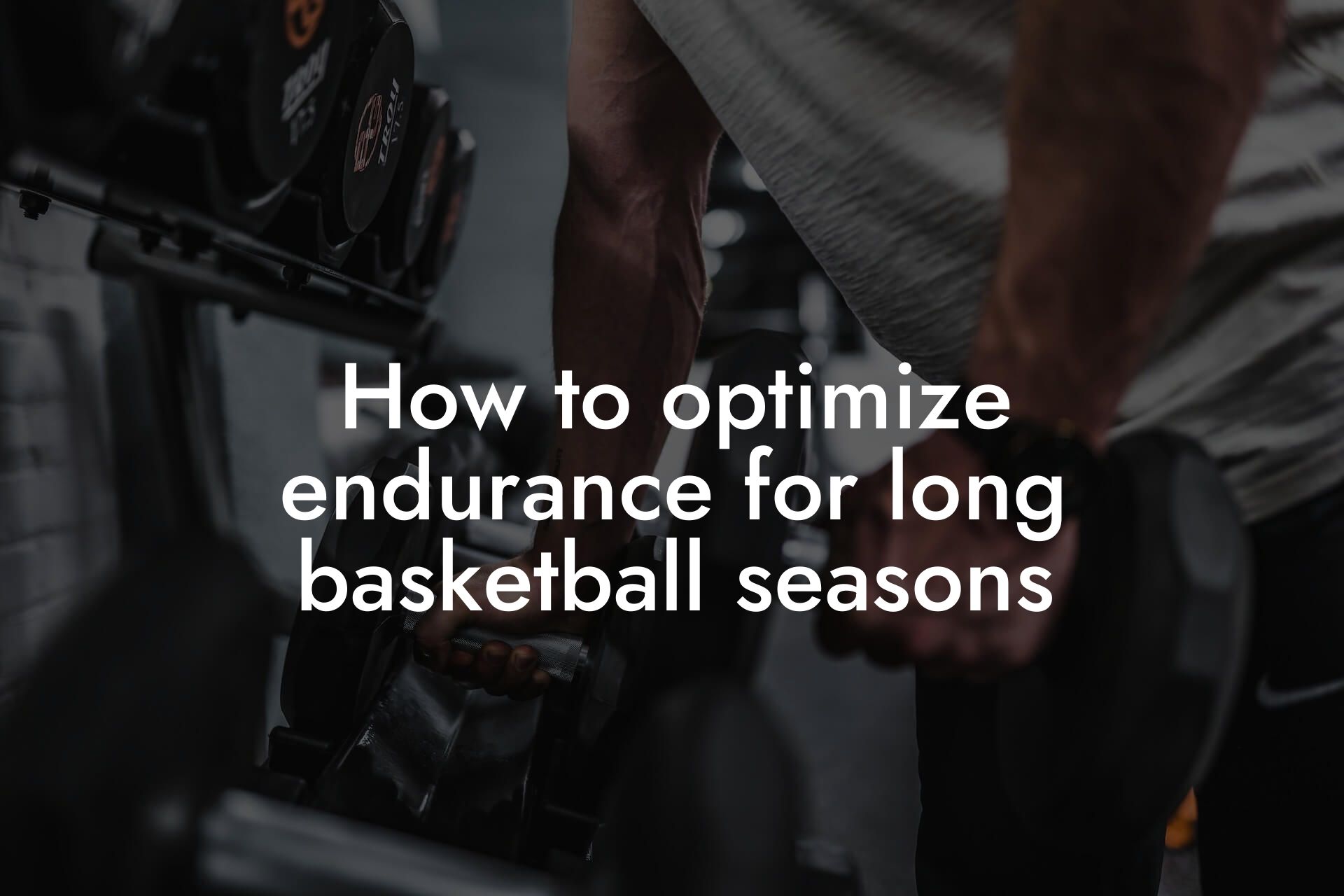As a professional basketball player, the off-season is a critical period for improving your skills, building your strength and endurance, and preparing for the upcoming season. A well-structured off-season training program can make all the difference in your performance on the court. In this article, we'll delve into the importance of off-season training, the key components of an effective program, and provide guidance on how to create a personalized plan tailored to your needs.
Table of Contents
The Importance of Off-Season Training
Off-season training is essential for professional basketball players to maintain and improve their physical conditioning, skills, and overall performance. During the season, players often focus on game-specific training, which can lead to plateaus and stagnation. The off-season provides an opportunity to step back, reassess, and work on areas that need improvement. A well-designed off-season training program can help players:
• Enhance their strength, power, and endurance
• Improve their speed, agility, and quickness
• Develop their skills, such as shooting, dribbling, and passing
• Increase their flexibility and mobility
• Reduce the risk of injury
• Gain a competitive edge over their opponents
Components of an Effective Off-Season Training Program
A comprehensive off-season training program should include a combination of the following components:
• Strength Training: Focus on building overall strength, power, and endurance through exercises such as squats, deadlifts, bench press, and rows.
• Conditioning: Incorporate high-intensity interval training (HIIT) and plyometric exercises to improve speed, agility, and endurance.
• Skill Development: Work on specific skills such as shooting, dribbling, and passing through drills and exercises.
• Flexibility and Mobility: Incorporate stretching and mobility exercises to improve range of motion and reduce the risk of injury.
• Nutrition and Recovery: Focus on proper nutrition and recovery strategies to support muscle growth and repair.
• Mental Preparation: Engage in mental training techniques such as visualization, meditation, and positive self-talk to improve mental toughness and focus.
Creating a Personalized Off-Season Training Program
To create a personalized off-season training program, players should consider the following factors:
• Goals: Identify specific goals for the off-season, such as improving shooting percentage or increasing vertical jump.
• Needs: Assess areas of weakness and prioritize training accordingly.
• Position: Tailor the program to the player's position on the court, taking into account the specific demands and requirements.
• Injury History: Take into account any past injuries and design the program to minimize the risk of re-injury.
• Availability: Consider the player's schedule and availability, ensuring the program is realistic and achievable.
The Role of DEXA Scanning in Off-Season Training
DEXA (Dual-Energy X-ray Absorptiometry) scanning is a valuable tool for professional basketball players during the off-season. A DEXA scan provides a comprehensive body assessment, including:
• Body Composition: Measures body fat percentage, lean mass, and bone density.
• Muscle Imbalance: Identifies any muscle imbalances or asymmetries.
• Injury Risk: Assesses the risk of injury based on bone density and muscle imbalances.
With this information, players can:
• Develop a targeted training program to address areas of weakness
• Monitor progress and adjust the program as needed
• Optimize their nutrition and recovery strategies
Sample Off-Season Training Program
Here is a sample off-season training program for a professional basketball player:
Monday (Strength Training):
• Squats (3 sets of 8 reps)
• Deadlifts (3 sets of 8 reps)
• Bench Press (3 sets of 8 reps)
• Rows (3 sets of 8 reps)
Tuesday (Conditioning):
• HIIT workout (30 seconds of high-intensity exercise followed by 30 seconds of rest)
• Plyometric exercises (box jumps, depth jumps)
Wednesday (Rest Day)
Thursday (Skill Development):
• Shooting drills (spot-up shots, catch-and-shoot)
• Dribbling drills (crossovers, behind-the-back)
• Passing drills (chest passes, bounce passes)
Friday (Flexibility and Mobility):
• Stretching exercises (hamstrings, quadriceps, hip flexors)
• Mobility exercises (leg swings, arm circles)
Saturday and Sunday (Rest Days)
A well-structured off-season training program is essential for professional basketball players to improve their performance, reduce the risk of injury, and gain a competitive edge. By incorporating the components of an effective program, creating a personalized plan, and utilizing tools like DEXA scanning, players can optimize their training and take their game to the next level.
At Tano Performance Group, we understand the importance of off-season training and provide professional basketball players with the tools and resources they need to succeed. Our DEXA scanning technology provides a comprehensive body assessment, helping players identify areas of weakness and develop a targeted training program. Contact us today to learn more about how we can help you achieve your goals.
Frequently Asked Questions
What is off-season training for professional basketball players?
Off-season training for professional basketball players refers to the period of time when they are not actively competing in games or tournaments. During this time, players focus on improving their skills, building their strength and endurance, and rehabilitating any injuries. The goal of off-season training is to return to competition in better shape than before, with improved performance and a reduced risk of injury.
Why is off-season training important for professional basketball players?
Off-season training is crucial for professional basketball players because it allows them to address any weaknesses or imbalances in their game, work on their overall fitness, and prepare for the demands of the upcoming season. It's also an opportunity for players to focus on injury prevention and rehabilitation, which is essential for maintaining a long and healthy career.
What are the key components of an off-season training program for basketball players?
A comprehensive off-season training program for basketball players typically includes a combination of strength training, conditioning, skill development, and injury prevention exercises. The program should be tailored to the individual player's needs and goals, and may include elements such as weightlifting, plyometrics, agility drills, and sport-specific skill work.
How long does off-season training typically last for professional basketball players?
The length of off-season training for professional basketball players can vary depending on the individual player's needs and goals, as well as the specific requirements of their team or league. Generally, off-season training can last anywhere from 2-6 months, with the most intense period of training typically occurring in the first 2-3 months.
What are the benefits of strength training for basketball players during the off-season?
Strength training is an essential component of off-season training for basketball players. It can help improve power, speed, and explosiveness, as well as increase endurance and reduce the risk of injury. Additionally, strength training can help players develop better body composition, including increased muscle mass and reduced body fat.
How can basketball players incorporate conditioning exercises into their off-season training program?
Conditioning exercises, such as cardio and agility drills, are an important part of off-season training for basketball players. These exercises can help improve endurance, speed, and agility, and can be incorporated into a player's program through a variety of methods, including high-intensity interval training (HIIT), pro agility shuttles, and ladder drills.
What are some effective ways for basketball players to improve their skill development during the off-season?
Basketball players can improve their skill development during the off-season through a variety of methods, including individual skill work, small group training, and video analysis. Players can also focus on developing specific skills, such as shooting, ball handling, and post play, through targeted drills and exercises.
How can basketball players incorporate injury prevention exercises into their off-season training program?
Injury prevention exercises, such as stretching, foam rolling, and strengthening exercises, are an essential component of off-season training for basketball players. These exercises can help reduce the risk of injury, improve flexibility and range of motion, and promote overall health and well-being.
What role does nutrition play in off-season training for basketball players?
Nutrition plays a critical role in off-season training for basketball players. A well-planned diet can help support muscle growth and repair, improve energy levels, and enhance overall performance. Players should focus on consuming a balanced diet that includes plenty of protein, complex carbohydrates, and healthy fats.
How can basketball players stay motivated during the off-season?
Staying motivated during the off-season can be a challenge for basketball players. However, there are several strategies that can help, including setting specific goals, finding a workout buddy or accountability partner, and tracking progress through metrics such as weight, body fat, and performance metrics.
What are some common mistakes that basketball players make during the off-season?
Some common mistakes that basketball players make during the off-season include not having a clear training plan, neglecting injury prevention exercises, and not prioritizing rest and recovery. Additionally, players may make the mistake of trying to do too much too soon, which can lead to burnout and increased risk of injury.
How can basketball players balance their off-season training with other responsibilities, such as family and social obligations?
Balancing off-season training with other responsibilities can be a challenge for basketball players. However, there are several strategies that can help, including creating a schedule and prioritizing training sessions, finding ways to incorporate family and friends into the training process, and taking regular breaks to rest and recharge.
What are some effective ways for basketball players to track their progress during the off-season?
Basketball players can track their progress during the off-season through a variety of methods, including metrics such as weight, body fat, and performance metrics, as well as subjective measures such as how they feel and their overall sense of well-being. Players can also use tools such as fitness trackers and mobile apps to track their progress.
How can basketball players stay accountable during the off-season?
Staying accountable during the off-season is crucial for basketball players. This can be achieved through a variety of methods, including working with a trainer or coach, finding a workout buddy or accountability partner, and tracking progress through metrics and regular assessments.
What are some common myths about off-season training for basketball players?
There are several common myths about off-season training for basketball players, including the idea that players need to take a complete break from training during the off-season, or that strength training will make players slower and less agile. However, these myths are not supported by scientific evidence, and a well-planned off-season training program can actually help improve performance and reduce the risk of injury.
How can basketball players incorporate mental preparation into their off-season training program?
Mental preparation is an essential component of off-season training for basketball players. This can be achieved through a variety of methods, including visualization exercises, positive self-talk, and mindfulness meditation. Players can also work with a sports psychologist or mental performance coach to develop a customized mental preparation program.
What are some effective ways for basketball players to manage stress and anxiety during the off-season?
Managing stress and anxiety is crucial for basketball players during the off-season. This can be achieved through a variety of methods, including exercise, meditation, and relaxation techniques, as well as seeking support from friends, family, and mental health professionals.
How can basketball players stay connected with their team and coaches during the off-season?
Staying connected with their team and coaches is important for basketball players during the off-season. This can be achieved through a variety of methods, including regular communication, attending team workouts and training sessions, and participating in team-building activities.
What are some effective ways for basketball players to prioritize rest and recovery during the off-season?
Prioritizing rest and recovery is essential for basketball players during the off-season. This can be achieved through a variety of methods, including getting enough sleep, taking regular breaks, and incorporating recovery techniques such as foam rolling and stretching into their training program.
How can basketball players incorporate technology into their off-season training program?
Incorporating technology into their off-season training program can be beneficial for basketball players. This can include using wearable devices to track progress, mobile apps to monitor nutrition and recovery, and video analysis software to improve skill development.
What are some effective ways for basketball players to stay hydrated during the off-season?
Staying hydrated is crucial for basketball players during the off-season. This can be achieved through a variety of methods, including drinking plenty of water, consuming hydrating foods such as fruits and vegetables, and avoiding sugary drinks and caffeine.
How can basketball players incorporate flexibility and mobility exercises into their off-season training program?
Incorporating flexibility and mobility exercises into their off-season training program can be beneficial for basketball players. This can include exercises such as stretching, foam rolling, and dynamic movement, which can help improve range of motion and reduce the risk of injury.
Here are some related articles you might love...
- Maintaining bone density to prevent injuries in basketball
- Strength and conditioning programs for basketball players
- How to optimize endurance for long basketball seasons
- The importance of hydration and nutrition in basketball
- How body composition impacts vertical leap in basketball
- The role of DEXA scans in monitoring basketball player health
- The impact of muscle mass on basketball agility and speed
- Reducing body fat for optimal basketball performance
- Nutrition tips for sustaining energy during basketball games
Zak Faulkner
Zak Faulkner is a leading authority in the realm of physical health and body composition analysis, with over 15 years of experience helping professionals optimise their fitness and well-being. As one the experts behind Tano Performance Group, Zak has dedicated his career to providing in-depth, science-backed insights that empower clients to elevate their physical performance and overall health.
With extensive knowledge of DEXA technology, Zak specializes in delivering comprehensive body assessments that offer precise data on body fat, muscle mass, bone density, and overall physique. His expertise enables individuals to make informed decisions and achieve their fitness goals with accuracy and confidence. Zak’s approach is rooted in a deep understanding of human physiology, combined with a passion for helping clients unlock their full potential through personalised strategies.
Over the years, Zak has earned a reputation for his commitment to excellence, precision, and client-focused service. His guidance is trusted by top professionals who demand the best when it comes to their health. Whether advising on fitness programs, nutritional strategies, or long-term wellness plans, Zak Faulkner’s insights are a valuable resource for anyone serious about taking their health and fitness to the next level.
At Tano Performance Group, Zak continues to lead our Content Team revolutionising how professionals approach their physical health, offering unparalleled expertise that drives real results.




